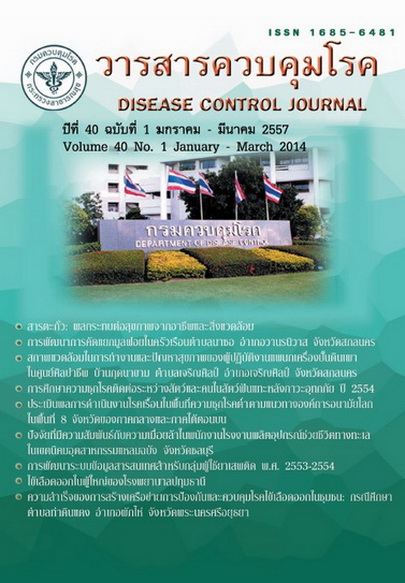Development of household solid waste sorting in Nasor village, Wanonniwad District, Sakonnakorn Province
DOI:
https://doi.org/10.14456/dcj.2014.27Keywords:
community waste sorting, household solid wasteAbstract
The purposes of this study were 1) to study and compare the knowledge and attitude of waste disposal management and to study and compare the amount of household waste before and after the intervention. This study was conducted in Nasor sub-district, Wanonniwad district, SakonNakhon province during December 2012 to September 2013. Data were collected from 128 households using questionnaire regarding waste management and knowledge and attitude of waste management as well. The meeting was organized to develop intervention focused on three activities including cleaning house, Phapa Ceremony, and food ingredient market. Data were analyzed using descriptive statistics including percentage, mean and standard deviation. The comparison between the knowledge and attitude of waste management before and after intervention was analyzed using Paired-t-test. The results of this study showed that after the intervention the amount of household waste per day was reduced significantly 31.70% (P-value < 0.001). In addition, the average of the knowledge and attitude of waste disposal management after intervention were significantly higher than of those before intervention (P-value < 0.001). In conclusion, the household waste disposal management intervention which participated by local people and community's leader could increase awareness of people and finally the household waste in community has been reduced.
Downloads
References
2. เมธา สกาวรัตน์. สธ. เตือนปชช. แยกขยะช่วงหน้าฝน หวั่นสารพิษไหลลงแหล่งน้ำธรรมชาติ. ฐานเศรษฐกิจ [อินเทอร์เน็ต]. [สืบค้นเมื่อ 2 ก.ค. 2556]. แหล่งข้อมูล: http://www.thanonline.com/index.php?option=com_content&view=article&id=187194&catid=176&Itemid=524
3. สำนักงานเทศบาลตำบลนาซอ. แผนชุมชนโครงการส่งเสริมพหุภาคีในการพัฒนาชุมชนอย่างยั่งยืน ภายใต้แผนปฏิบัติการ 21 ระดับท้องถิ่น (local agenda 21). สกลนคร: สำนักงานเทศบาลตำบลนาซอ; 2554.
4. สำนักงานนโยบายและแผนทรัพยากรธรรมชาติและสิ่งแวดล้อม. แผนจัดการคุณภาพสิ่งแวดล้อม พ.ศ. 2555-2559. กรุงเทพมหานคร: สำนักงานนโยบายและแผนทรัพยากรธรรมชาติและสิ่งแวดล้อม; 2554.
5. โรงพยาบาลส่งเสริมสุขภาพตำบลบ้านนาซอ. โครงการหมู่บ้านน่าอยู่ ถนนน่ามอง คลองสะอาด ปราศจากโรคภัย ปีงบประมาณ 2555. สกลนคร: โรงพยาบาลส่งเสริมสุขภาพตำบลนาซอ; 2555.
6. กรมควบคุมมลพิษ. แผนจัดการมลพิษ พ.ศ. 2555-2559 [อินเทอร์เน็ต]. [สืบค้นเมื่อ 28 พ.ย. 2555]. แหล่งข้อมูล: http://www.pcd.go.th/public/Publications/print_pol. cfm?task=plan 55to59
7. ครรชิต พุทธโกษา. คู่มือการพัฒนาชุมชนแห่งการเรียนรู้ ฉบับสมบูรณ์ [อินเทอร์เน็ต]. 2554 [สืบค้นเมื่อ 2 ธ.ค. 2555]. แหล่งข้อมูล: www.nrct.go.th/downloads/ sci_adviser/manual_develop_community .pdf
8. กรมอนามัย กระทรวงสาธารณสุข. การประชุมปฏิบัติการอย่างมีส่วนร่วมและสร้างสรรค์ A-I-C [อินเตอร์เน็ต]. [สืบค้นเมื่อ 16 ธ.ค. 2555]. แหล่งข้อมูล: http://advisor.anamai.moph.go.th/tamra/AIC/aicO2.html
9. กัลยรัตน์ ดารา. การพัฒนากิจกรรมคัดแยกประเภทขยะมูลฝอยของผู้นำชุมชนในเขตเทศบาลตำบลมหาราช อำเภอมหาราช จังหวัดพระนครศรีอยุธยา พระนครศรีอยุธยา: มหาวิทยาลัยราชภัฏพระนครศรีอยุธยา; 2551.
10. กรวิทย์ แก้วจันทา. การพัฒนาศักยภาพการคัดแยกมูลฝอยของประชาชนเทศบาลตำบลเชียงยืน อำเภอเชียงยืน จังหวัดมหาสารคาม [วิทยานิพนธ์ปริญญา สาธารณสุขศาสตรมหาบัณฑิต]. ขอนแก่น: มหาวิทยาลัยขอนแก่น; 2553.
11. Timlett ER, Williams DI. Public participation and recycling performance in England: comparison of tools for behaviour change. Resources, Conservation and Recycling 2008;52:622-34.
12. Tai J, Zhang W, Che Y, Feng D. Municipal solid waste source-separated collection in China: a comparative analysis. Waste Management 2011;31:1637-82.
13. วรงค์ บุญระมี. การมีส่วนร่วมแก้ไขปัญหามูลฝอยในชุมชนตำบลนาเข อำเภอบ้านแพง จังหวัดนครพนม [วิทยานิพนธ์ปริญญาสาธารณสุขศาสตรมหาบัณฑิต]. ชลบุรี: มหาวิทยาลัยบูรพา; 2550.
14. ทัศนียา นิลพุดซา. การพัฒนาการคัดแยกมูลฝอยของครัวเรือนชุมชนหนองเม็ก ตำบลสาวะถี อำเภอเมือง จังหวัดขอนแก่น [วิทยานิพนธ์ปริญญาสาธารณสุขศาสตร-มหาบัณฑิต]. ขอนแก่น: มหาวิทยาลัยขอนแก่น; 2555.
Downloads
Published
How to Cite
Issue
Section
License
Articles published in the Disease Control Journal are considered as academic work, research or analysis of the personal opinion of the authors, not the opinion of the Thailand Department of Disease Control or editorial team. The authors must be responsible for their articles.






